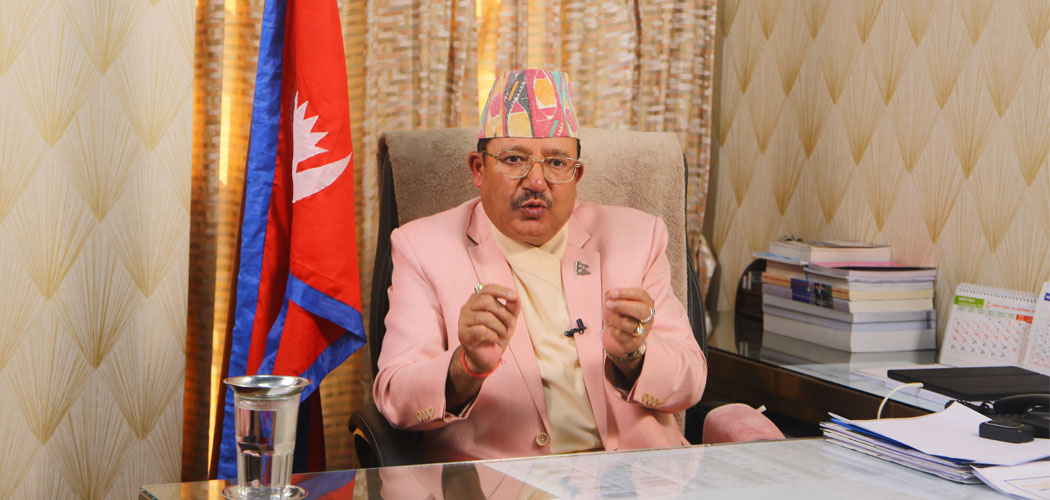
SATV Kathmandu Oct 10: The election to the House of Representatives (HoR) is scheduled for March 5, 2026, following the political transition that emerged after the recent Gen-Z uprising, which led to the formation of an interim government. As the country prepares for one of the most closely watched elections in its history, the Election Commission (EC) has intensified its efforts to ensure a free, fair, credible, and fear-free electoral process. From resuming voter registration through an ordinance and holding consultations with political parties and security agencies, to planning for green and cost-effective elections, the Commission is working round the clock to build public confidence and coordination among stakeholders.
In this context, Arpana Adhikari of The Rising Nepal and the team of Gorkhapatra talked to Acting Chief Election Commissioner Ram Prasad Bhandari about the ongoing preparations, challenges, security arrangements, code of conduct and the Commission’s vision for conducting a transparent and credible election. Excerpts:
How are the preparations progressing for the upcoming House of Representatives election scheduled for March 5, 2026, and what is the current situation surrounding it ?
Since the President announced the election date on September 12, the Election Commission has been actively working to ensure its smooth and successful conduct. After the announcement, we resolved the first legal hurdle related to voter registration, as the existing law prohibits new registrations once the election date is declared.
The Commission urged the concerned authorities to reopen registration and proposed an amendment allowing citizens who turn 18 by March 4, 2026, to vote on March 5 in their constituencies. The President has issued the ordinance accordingly and the voter’s registration process has now been resumed.
Similarly, for the effective management and conduct of the election, we have been holding a series of discussions with the concerned authorities, including concerned ministries.
In Tuesday’s meeting with Prime Minister Karki and cabinet ministers and chiefs of security agencies, the government assured us that the Commission will be provided with all necessary resources. Only the formal process of submitting and approving the written resource demand remains, which we expect to be completed by October 13.
How much budget has the Commission projected for conducting the upcoming election ?
We are calculating the exact cost of holding the election. In past elections, the largest amount was spent for items not produced in Nepal, such as ballot papers, printing materials and ballot boxes, which had to be imported.
This time, we already have leftover ballot boxes from previous elections and more than double the required amount of paper, so there is no need to purchase these items. Only a few other items will need to be procured from abroad, significantly reducing overall expenses. These items will be purchased through a competitive and transparent process. Furthermore, from the beginning, we have emphasized using nationally and locally produced items as much as possible. By relying on these local resources, we do not anticipate any unusual or excessive expenses for the election.
We are also promoting the concept of a “green election,” aiming to reduce the use of plastic materials, an approach practiced in countries like the Philippines, Malaysia, and India. While eliminating plastic use entirely is not possible, we are committed to minimizing it.
Preparations are underway in coordination with the government, which has assured full support in providing necessary resources. The Commission is also holding consultations with political parties, media, civil society, human rights groups, and other stakeholders to support election process.
The Commission is confident that the election will be conducted in a free, fair, impartial, and fear-free manner.
To ensure the election remains credible and transparent, and given that Nepal’s Election Commission is recognized among the top 10 globally for conducting free and fair polls, what preparations are being made to uphold this reputation and earn continued appreciation from the international community ?
Among election commissions worldwide, Nepal’s Election Commission, which was recognized by the Constitution of 2023 B.S., has a long and distinguished history. It has successfully conducted elections at various stages, including the historic referendum, reflecting its enduring institutional legacy.
I have also had the opportunity to observe elections in some of the most developed countries, and I found more similarities than differences in their electoral processes. To maintain the reputation of the election body, those conducting the elections must demonstrate strong commitment and integrity.
A free, fair, impartial, transparent, and fear-free election is possible only when all stakeholders, including voters and candidates, adhere to the legal framework. The Commission firmly believes that its reputation will remain strong and will continue to grow, not fade.
This election is being held following the political unrest triggered by the recent Gen-Z uprising, which led to the replacement of the elected government. How is the Commission preparing to bring all stakeholders, including Gen-Z representatives and political parties, together for dialogue and engagement?
The Election Commission has been actively holding discussions to facilitate dialogue and discuss election matters from different perspectives. As part of this process, the Commission has scheduled a meeting with political parties on October 16.
All political parties registered with the Commission, including those that won at least one ward member in the last local elections, have been invited for discussions. We have also stated that any new political parties wishing to participate must complete their registration and obtain a certificate before October 16, as only registered parties will be eligible to take part in the March 5 elections.
The Commission has been providing guidance and counseling to parties regarding this process. Currently, 122 political parties are registered with the Commission, and more are in the process of getting registered. Only those registered by October 16 with a valid certificate, election manifesto, and programmes will be eligible to participate in the election.
The Commission will assist and facilitate them in participating in the election.
To ensure the election is held in a fear-free environment, the security agencies must maintain high morale. During the Gen-Z movement, 197 buildings of Nepal Police were completely destroyed, 258 partially damaged, and 174 vehicles were burned. In such a situation, how has the Commission been coordinating with the government to assure the public that the polls will be conducted safely and without fear ?
For the successful and peaceful conduct of the election in a fear-free environment, security agencies are key stakeholders. These include the Nepal Police, Armed Police Force, Nepali Army, and the National Investigation Department.
The ability to conduct a peaceful election largely depends on the commitment and willingness of these security agencies. With their cooperation, peace and security can be maintained under any circumstances. This is central to ensuring a smooth election.
So far, in discussions with the government authorities, including the Prime Minister, Home Minister, and heads of security agencies, they have assured us that, despite some damage to infrastructure, they are prepared and motivated to maintain high morale and ensure a safe election environment. Given the current circumstances in the country, questions may arise about election security.
However, such concerns are common in every election, and they are issues that can be addressed and resolved. Our security agencies are fully capable, and the Commission is confident that the election will be conducted peacefully.
With the new voter list being prepared, can young voters register their names from anywhere in the country, or must they register in their respective constituencies ?
Yes, they can register their names at any Election Commission office across the country that has biometric facilities. However, to cast their votes, they must go to their own constituency. They need to indicate their permanent residence in the registration form.
Thus, while registration can be completed through provincial or district office of the Commission, voting must take place in their designated constituency.
In line with the practice of allowing national and international agencies to monitor elections in Nepal, how is the Commission preparing to facilitate observers for the upcoming elections ?
The Commission has already prepared the election schedule, and in line with it, letters will be sent to international agencies and election commissions to facilitate election monitoring. National observers, including human rights activists, media representatives, and others interested in monitoring the election, will be invited to submit applications.
Once the procedure is completed, the Commission will make decisions and grant permits for election observation, following established rules.
This practice has been followed in previous elections, and we will continue. Observers will prepare reports based on their observation and these reports will be made public.
I also assure that the Commission is committed to conducting the election in a fair, independent, impartial, transparent and peaceful manner, ensuring that no one can question its integrity or dedication.
The Commission has several tasks to complete in preparation for the election. When will the full election programme be released to the public ?
The internal election programme is intended for the Commission’s internal use and does not need to be made public, nor is it required to be kept secret. However, the Commission has released the election schedule, detailing the entire process from party registration to the counting of votes.
This schedule is also published in the Nepal Gazette and is accessible to the public.
Will the EC introduce an electronic voting system, or will it continue the traditional paper-based voting method ?
This matter needs to be viewed through careful analysis. Even internationally, some countries have reverted to traditional paper voting due to concerns over the credibility of electronic systems. Globally, various voting methods existpostal, e-voting, manual, and pre-election voting, and countries like India even facilitate home voting for certain groups.
In Nepal’s case, since the election was announced at a short notice, adopting new technology with limited time and resources could risk the integrity of the process. While the Commission supports modernizing elections, such a shift requires years of preparation.
Therefore, this election will be conducted following the traditional paper-based voting system.
Has the Commission made any plans to ensure that the upcoming election is gender-friendly and accessible for persons with disabilities and the elderly ?
We have a practice of facilitating the elderly, persons with disabilities and pregnant or postpartum mothers during elections.
Regarding inclusiveness, the Constitution and law guarantee many rights, including the 33 per cent women’s representation at various levels. We make sure that no one will be deprived of their right to be nominated or elected.
The Commission will act within the criteria set by the Constitution and existing laws regarding candidate quotas for different clusters.



















